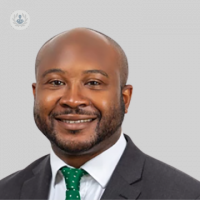FAQs regarding prostate cancer
Written in association with:In one of our latest medical articles below, revered consultant urologist, Mr Nkwam Michael Nkwam, offers his expert insights into all things prostate cancer, including how the common cancer is typically diagnosed, and what treatment options patients diagnosed with prostate cancer have available to them.

What is prostate cancer?
Prostate cancer is a type of cancer that begins in the cells of the prostate gland, where fluid is produced. It is one of the most common cancers among men, and affects over 400,000 men in the UK. Each year, over 50,000 men are diagnosed with prostate cancer.
Early stages of prostate cancer do not cause any symptoms, but as it progresses, it can lead to pelvic discomfort, difficulty urinating, and/or blood in the urine.
How is prostate cancer diagnosed?
It is typically diagnosed via a physical examination and a PSA blood test. A PSA test measures the amount of protein produced by the prostate. An MRI scan will then measure the extent of the prostate cancer. A prostate biopsy is the next step to confirm or rule out the presence of prostate cancer.
What are the symptoms of prostate cancer?
A weak or interrupted urine flow and erectile dysfunction are also very common symptoms, alongside the symptoms mentioned above.
What are the risk factors for prostate cancer?
The main risk factors include age, family history, race, and certain genetic factors.
What are the treatment options for prostate cancer?
Treatment options depend on the stage of the cancer and your overall health. Common treatments include active surveillance, surgery (prostatectomy or brachytherapy), hormone therapy, chemotherapy, and radiotherapy.
To consult with Mr Nkwam Michael Nkwam, head over to his Top Doctors profile today.


